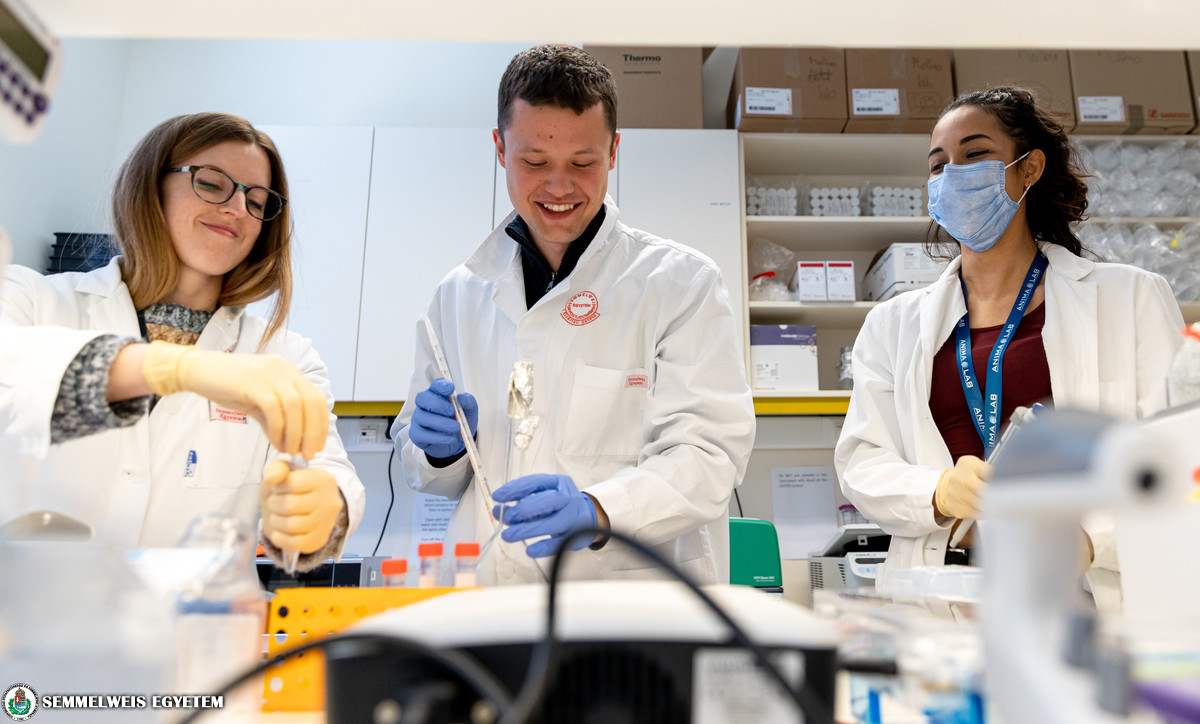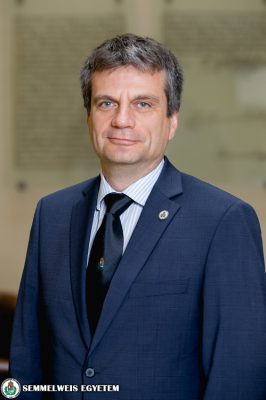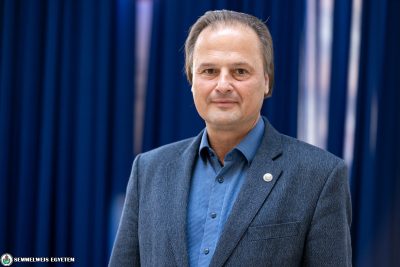“It was TDK that sparked my interest in doctoral training, which then lasted until the end of university,” Dr. Bálint Barta, PhD student at the Városmajor Heart and Vascular Center says. As he points out, there he can focus on what has always attracted him: the topic of cardiology and heart failure. He believes that doctoral education provides a unique opportunity for students to look at a small slice of science very thoroughly and that the experience gained in full-time research is also very important for those who will later become practising doctors.
Dr. Éva Pál also got close to research as a TDK student. After graduation, it was no question for her to stay at Semmelweis University for a PhD, as she could continue her research on vitamin D deficiency, which she had started as a student researcher. She says she really liked the diversity of research work, being able to do manual work in the lab or in-depth analysis of the results or to write scientific articles at the same time. Good community was also an attracting factor. “I have experienced here what it feels like being a real member of a team, looking for answers to questions that I am personally interested in. During your PhD years, you learn to gather information in a credible way, to evaluate it critically. There are many opportunities to develop your presentation skills, and in the lab you are facing new challenges every day. Solving of these gives you a great feeling of success,” Dr. Éva Pál, a recent PhD graduate and assistant professor at the Institute of Translational Medicine points out.
“As a doctor you need a lot of experience, to meet real patients instead of an artificial head. Papers are papers but practice makes your knowledge perfect, it is the most important for doctors” Dr. Li Xinda, PhD student, Periodontology and Implantology specialist of Semmelweis University emphasizes. “Teeth are fundamental for everything, if this part goes wrong in human body, everything goes wrong, that’s why I chosed periodontology. My PhD topic is the soft tissue around the dental implant,” he explaines. As he points out, he decided to take part in the Doctoral Program because he wants to be scientific active later in his carreer either in Hungary or back in China.
Our PhD students are the future of Semmelweis University, and increasing their number is a key issue for our research and teaching staff, our excellence and our position in the rankings
– Dr. Béla Merkely emphasised.
 The Rector recalled that Semmelweis University’s strategic goal is to be among the TOP 100 higher education institutions in the world and among the TOP 5 medical universities in Europe. The university’s position in international rankings is improving: in the latest ranking of Times Higher Education (THE), it has moved up 149 places to the TOP 300, in THE’s list of specialised fields it is in the TOP 200, and in the US News Best Global Universities 2022 ranking, in the cardiovascular field it is already in 55th place. High priority is to continue to improve our academic performance, and the number of PhD students is the key to this,” the Rector pointed out, adding that two-thirds of the ranking results are influenced by indicators related to research and development and innovation.
The Rector recalled that Semmelweis University’s strategic goal is to be among the TOP 100 higher education institutions in the world and among the TOP 5 medical universities in Europe. The university’s position in international rankings is improving: in the latest ranking of Times Higher Education (THE), it has moved up 149 places to the TOP 300, in THE’s list of specialised fields it is in the TOP 200, and in the US News Best Global Universities 2022 ranking, in the cardiovascular field it is already in 55th place. High priority is to continue to improve our academic performance, and the number of PhD students is the key to this,” the Rector pointed out, adding that two-thirds of the ranking results are influenced by indicators related to research and development and innovation.

The aim of Semmelweis University is to make its PhD Program as varied and flexible as possible, so that they are accessible to the most talented people in the most diverse life situations,” Dr Péter Ferdinandy, Vice-Rector for Science and Innovations emphasised.

As he pointed out, the PhD degree is an entry point for those who envisage their future in the research and development field or who would like to continue their career as a teacher or researcher at the university, but it is also very useful for clinicians: they will be able to use their knowledge in a more critical, synthesising way and apply it for the benefit of patients.
Dr Péter Ferdinandy pointed out that the Cooperative Doctoral Program (KDP) is one of the many opportunities available, with 29 participants from the University so far. This is a good option for those who would like to obtain a degree while working, for example, at a research and development company, a health authority or a pharmaceutical company. Funding is also available through the National Research, Development and Innovation Office. Dr. Péter Ferdinandy stressed that they would also like to increase the number of foreign PhD students, because a degree complemented by a Doctoral Program is extremely valuable on the international market.
The most extensive doctoral program in the field of medicine and health sciences is the Semmelweis’ Doctoral Program
Semmelweis University’s eight doctoral schools cover the full range of medical and health sciences, from cardiac surgery to sociology. A total of 800 PhD students are currently studying there. The number of PhD students has risen steadily in recent years, with the number of publicly funded students increasing one and a half times last year from 170 to 250, and this year, the same number of students can be admitted to the publicly funded system.
The number of fellowship places exceeds the number of other training places in the field, and we have always been able to fill them to capacity,” Dr. Zoltán Benyó said. Education is bilingual, English and Hungarian, so it is open to international students. Many students come through the Stipendium Hungaricum, the most prestigious higher education scholarship programme, which is open to applications from around 100 countries, but Zoltán Benyó also highlighted the MD-PhD scheme, which is open to foreign students, and the state fellowship places for students coming from EU countries.
I would recommend PhD training to anyone interested in science and research. Hungarian and international graduate students here at Semmelweis University are really very close to joining world-class research groups of high prestige
– Dr. Zoltán Benyó, President of the Doctoral Council of Semmelweis University said. Applications for all PhD studies at Semmelweis University are open until mid-May:
- classic 4-year PhD course: state fellowship or self-financed
- Individual Doctoral Program: open to those who have almost all the scientific results and conditions needed to enter the Dissertation Phase
- MD-PhD Excellence Programme: can start two years before the end of the undergraduate studies and then, after graduation, allows entry to the second phase, also two years, with a complex examination. It is important that it is also open to international students (see the grey box for details)
- Translational Medicine Training Programme: particularly recommended for those who wish to pursue a PhD alongside specialist training (see the grey box for details)

A prolonged entrance examination is expected to take place in early September at the latest, up-to-date information will be posted on the Doctoral School’s website. A PhD degree is a recognition that its owner is capable of doing independent scientific work. PhD studies is also open to those who are about to have children, as the University is flexible and compatible with this.
Dr. Zoltán Benyó said that the Semmelweis 250+ PhD fellowship program, which was launched under the tender EFOP 3.6.3, will be continued next academic year with the University’s own funds. It provides students with an additional supplement of 50 percent of the state fellowship. Host institutions have the possibility to top up this extra amount by at least the same amount.
On 5th May an information forum on PhD Program will be organised by the Doctoral School (DI) in Hungarian and English. Further details will be available on the DI website.
Translational Medicine Training Program
Launched last year, the Translational Medicine PhD programme aims to provide opportunity to pursue specialist training and research work simultaneously, with protected time during working hours for both activities. The next semester of the English-language program, led by Dr Péter Hegyi, Director of the Centre for Translational Medicine, will start at the end of August, with applications open until 15th May and two online information webinars: one in Hungarian on 21st April and one in English on 28th April. More information: https://tm-centre.org/hu/oktatas/phd-kepzes-nyitooldal/
MD-PhD training at Semmelweis University
The MD-PhD Excellence Program, introduced in 2017, gives medical, dental and pharmacy students the opportunity to start their doctoral studies in the last two years of their undergraduate studies with state fellowship. Students who are supported must complete a doctoral course worth of 4 credits per semester, certified by the course supervisor. After completion of their undergraduate studies, they will enter into the Doctoral Program as individual degree holders and will be able to obtain a degree again (up to 24 months) with fellowship support. The condition for admission is an intensive and effective TDK work, but it is also important that the student must have a realistic chance of having a publication by the time he/she graduates. The MD-PhD Program benefits those who have previously been deterred from obtaining a degree by the length of their training.
Edited by Pálma Dobozi
Translation by Rita Kónya
Photo illustrations: Kovács Attila – Semmelweis University


